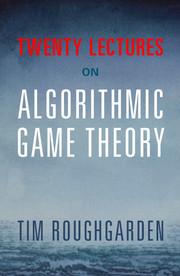Book contents
- Frontmatter
- Dedication
- Contents
- Preface
- 1 Introduction and Examples
- 2 Mechanism Design Basics
- 3 Myerson's Lemma
- 4 Algorithmic Mechanism Design
- 5 Revenue-Maximizing Auctions
- 6 Simple Near-Optimal Auctions
- 7 Multi-Parameter Mechanism Design
- 8 Spectrum Auctions 97
- 9 Mechanism Design with Payment Constraints 113
- 10 Kidney Exchange and Stable Matching
- 11 Selfish Routing and the Price of Anarchy
- 12 Over-Provisioning and Atomic Selfish Routing
- 13 Equilibria: Definitions, Examples, and Existence
- 14 Robust Price-of-Anarchy Bounds in Smooth Games
- 15 Best-Case and Strong Nash Equilibria
- 16 Best-Response Dynamics
- 17 No-Regret Dynamics
- 18 Swap Regret and the Minimax Theorem
- 19 Pure Nash Equilibria and PLS-Completeness
- 20 Mixed Nash Equilibria and PPAD-Completeness
- The Top 10 List
- Hints to Selected Exercises and Problems
- Bibliography
- Index
Preface
Published online by Cambridge University Press: 05 August 2016
- Frontmatter
- Dedication
- Contents
- Preface
- 1 Introduction and Examples
- 2 Mechanism Design Basics
- 3 Myerson's Lemma
- 4 Algorithmic Mechanism Design
- 5 Revenue-Maximizing Auctions
- 6 Simple Near-Optimal Auctions
- 7 Multi-Parameter Mechanism Design
- 8 Spectrum Auctions 97
- 9 Mechanism Design with Payment Constraints 113
- 10 Kidney Exchange and Stable Matching
- 11 Selfish Routing and the Price of Anarchy
- 12 Over-Provisioning and Atomic Selfish Routing
- 13 Equilibria: Definitions, Examples, and Existence
- 14 Robust Price-of-Anarchy Bounds in Smooth Games
- 15 Best-Case and Strong Nash Equilibria
- 16 Best-Response Dynamics
- 17 No-Regret Dynamics
- 18 Swap Regret and the Minimax Theorem
- 19 Pure Nash Equilibria and PLS-Completeness
- 20 Mixed Nash Equilibria and PPAD-Completeness
- The Top 10 List
- Hints to Selected Exercises and Problems
- Bibliography
- Index
Summary
Computer science and economics have engaged in a lively interaction over the past 15 years, resulting in a new field called algorithmic game theory or alternatively economics and computation. Many problems central to modern computer science, ranging from resource allocation in large networks to online advertising, fundamentally involve interactions between multiple self-interested parties. Economics and game theory offer a host of useful models and definitions to reason about such problems. The flow of ideas also travels in the other direction, as recent research in computer science complements the traditional economic literature in several ways. For example, computer science offers a focus on and a language to discuss computational complexity; has popularized the widespread use of approximation bounds to reason about models where exact solutions are unrealistic or unknowable; and proposes several alternatives to Bayesian or average-case analysis that encourage robust solutions to economic design problems.
This book grew out of my lecture notes for my course “Algorithmic Game Theory,” which I taught at Stanford five times between 2004 and 2013. The course aims to give students a quick and accessible introduction to many of the most important concepts in the field, with representative models and results chosen to illustrate broader themes. This book has the same goal, and I have stayed close to the structure and spirit of my classroom lectures. Brevity necessitates omitting several important topics, including Bayesian mechanism design, compact game representations, computational social choice, contest design, cooperative game theory, incentives in cryptocurrencies and networked systems, market equilibria, prediction markets, privacy, reputation systems, and social computing. Many of these areas are covered in the books by Brandt et al. (2016), Hartline (2016), Nisan et al. (2007), Parkes and Seuken (2016), Shoham and Leyton-Brown (2009), and Vojnović (2016).
Reading the first paragraph of every lecture provides a quick sense of the book's narrative, and the “top 10 list” on pages 299–300 summarizes the key results in the book. In addition, each lecture includes an “Upshot” section that highlights its main points. After the introductory lecture, the book is loosely organized into three parts.
- Type
- Chapter
- Information
- Twenty Lectures on Algorithmic Game Theory , pp. xi - xivPublisher: Cambridge University PressPrint publication year: 2016

